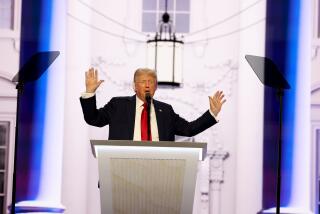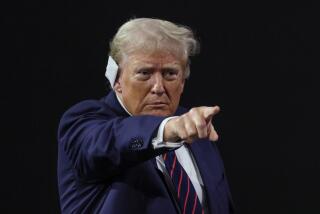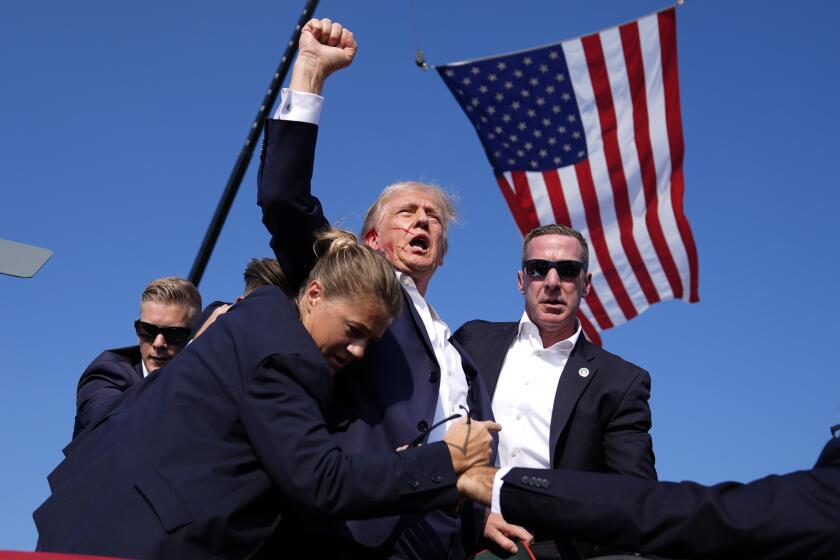Convictions Not Defined, Critics Say : Bush’s Visibility High but His Image Is Seen as Fuzzy
NEW YORK — George Bush was at his best. Standing before a 15-foot-high replica of the White House at a fund-raiser in the Waldorf Astoria ballroom, the vice president was persuasive, even passionate--about America’s competition with the Soviets, about the nation’s need for a stronger educational system, about his own qualifications for the presidency. He walked away from his audience of rich Republicans elated, his campaign banking $850,000.
Two days later, however, graduating students at the University of New Hampshire saw the other George Bush, the bloodless technocrat who seems to lack a feel for what the Rev. Jesse Jackson calls “the unrich and the unwhite.”
His commencement address last week, on the need for military strength, was punctuated by squirt-gun fights among the graduates and a protest against Bush’s support for the contras in Nicaragua. Within three minutes, he had lost the audience--a loss magnified by saturation media coverage in a key early primary state.
The two events occurred in the midst of a long-planned and carefully crafted effort by the vice president’s strategists to begin spotlighting his political priorities and personal convictions. Together, they encapsulate the promise and the problem of George Bush in the early marches of the 1988 campaign:
He has the organization, the money, the visibility that go with his long career and his current office. He is awash in endorsements and leads his Republican challengers in nearly every poll. But Bush’s problem, according to his own aides and advisers to other GOP candidates, threatens to obliterate all his other advantages. And the problem is not so much Ronald Reagan or the Administration’s record, nor the spreading stain of the Iran-contra affair, which follows the vice president everywhere.
The heart of Bush’s problem is George Bush.
Despite his 25 years in public life, the American voter still has only a fuzzy image of the man himself, what he stands for down inside--what his convictions are, where he would lead the country should the people elect him President.
‘Never Been in a Fight’
“Bush’s problem is that he’s a man with a long resume but no accomplishments” is the way a waspish adviser to one of Bush’s Republican rivals put it. “He’s held a dozen positions, but he’s never been in a fight. There is no identification in the public mind between George Bush and any firmly held positions . . . . He has no philosophy.”
Bush’s own aides acknowledge there is a problem, although they insist that it can be solved. “The level of generality has disappointed some people,” a top Bush aide conceded in discussing a recent campaign swing.
In going over drafts of speeches, the aide noted, Bush had deleted some specific proposals on improving the nation’s educational system. “We don’t want to do too much too soon,” the aide said.
This undefined image and political agenda have left Bush vulnerable to criticism from all sides. Despite his unflagging support for President Reagan, he has been attacked by members of his own party, some of whom have branded him a “wimp.”
Forging a Philosophy
In a series of college commencement addresses and political appearances over the last several weeks, Bush has been trying to overcome that perception and forge a public philosophy. The speeches arose out of a number of meetings earlier this year with Bush’s political advisers and his poll taker, Robert Teeter of Market Opinion Research in Detroit.
“The speeches were his idea back in January,” Teeter said in a recent interview. “He told us: ‘Here are some of the themes I want to stress.’ We refined them, spent a lot of time talking about them. We started with about seven or eight and then narrowed the list.
“The political mileage he ought to get out of those, when he’s done after six or eight weeks, is that the public ought to have a sense that here are the two or three things George Bush thinks are really important, and he will probably keep talking about them,” Teeter said.
In broad terms, the themes Bush has settled on are competence and character; education and technology; and improving relations with the Soviet Union while maintaining a strong military. Interwoven among these threads will be an emphasis on preparing America for the next decade and the next century, a forward-looking attitude that contrasts with Bush’s 1980 campaign, in which he looked backward and stressed his experience.
‘New Set of Challenges’
“The 1990s will bring a dramatically new set of challenges from the ones we faced in the 1970s and 1980s,” Bush told the graduates of St. Louis University in Missouri two weeks ago. “These different challenges will require a new strategy. We’re moving into a society based on information and knowledge, an economy fully integrated into a global market, and a world where change is the rule, not the exception.”
Bush said in St. Louis that “technology is America’s economic fountain of youth.” He sought to dramatize that sentiment by paying a visit to a Monsanto Co. biotechnology laboratory, where he donned a white laboratory coat and was led through the process of splicing genetic materials to produce a strain of drought-resistant grain.
At Albion College in Michigan a week earlier, Bush had introduced his theme of character, morality and family values. He criticized those in government--and even some former members of the Reagan Administration--”who haven’t had the judgment or integrity to put the public’s business above their own selfish interests.” He urged teachers, parents and students to embrace and pass on “the basic values.”
“Many in this country still have much to learn about right and wrong,” the vice president said. “Recently, we’ve seen stories about illegal insider trading schemes on Wall Street and improper influence peddling in Washington. But, just because we support free enterprise doesn’t mean we can’t be critical of its excesses. And, as for those who go over the line into criminality, I say throw the book at them.”
Dialogue and Strength
Bush chose the May 20 commissioning ceremony at the U.S. Naval Academy to introduce the outlines of his ideas on national defense and security. He said U.S. relations with the Soviets should be grounded in realism, dialogue and strength. He promised progress in arms control talks and gave a less-than-ringing endorsement of the Strategic Defense Initiative, Reagan’s “Star Wars” anti-missile defense system.
“Maybe not in the short term, but in the long term, SDI will be, in my view, an effective deterrent,” Bush said, adding that the United States “must resist the anti-intellectual temptation to cut off the research, development and testing” of SDI. He did not tread on the more difficult territory of when or how the “Star Wars” system should be deployed.
In the Annapolis speech and at the University of New Hampshire, Bush emphasized the need to strengthen America’s conventional forces, a favorite Democratic theme.
Short on Specifics
The commencement speeches, by design, are long on themes and short on specifics, Bush aides acknowledged. Bush and his advisers decided not to go further in spelling out positions and carving out a distinct identity for the Bush candidacy, at least not yet. Bush plans to formally announce his candidacy this fall.
There is a sense in the Bush entourage that, with the general election still 18 months away, this is still the political exhibition season. Like a baseball team in spring training, the drill is to loosen up, work on fundamentals and don’t give anything away to your future opponents.
More to Read
Get the L.A. Times Politics newsletter
Deeply reported insights into legislation, politics and policy from Sacramento, Washington and beyond. In your inbox three times per week.
You may occasionally receive promotional content from the Los Angeles Times.










